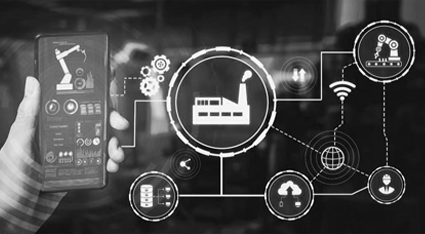Quick Summary
Businesses constantly seek innovative solutions to streamline operations and maximize efficiency. Robotic Process Automation (RPA) promises to revolutionize how businesses automate repetitive tasks.
RPA offers a unique approach to automation by leveraging software robots to perform mundane and time-consuming tasks, allowing employees to focus on more strategic initiatives. From data entry and document processing to customer support and invoice management, RPA can potentially transform virtually every aspect of your business workflow.
The blog discusses how RPA can help businesses to automate and optimize their business processes.
Understanding How Workflow Automation Works
Step 1: Identifying Repetitive and Manual Tasks
Workflow automation begins with identifying repetitive, time-consuming, and error-prone tasks.
Step 2: Designing and Mapping Workflows
Organizations design and map workflows with identified tasks, establishing a clear sequence of actions, rules, and decision points. This process lays the groundwork for smooth and efficient automation.
Step 3: Implementing Workflow Automation Software
The next step is selecting and deploying workflow automation software tailored to specific organizational needs. These software solutions provide the tools and functionalities to automate and oversee workflows seamlessly.
Step 4: Training Employees and Managing Change
Successfully adopting workflow automation hinges on properly training employees on new processes and nurturing a culture conducive to change.
Benefits of RPA
1. Time Savings
RPA streamlines repetitive administrative tasks, allowing employees to focus on strategic endeavors and boosting overall productivity.
2. Increased ROI
By enhancing work productivity and collecting valuable data over time, RPA positively impacts Return on Investment (ROI), improving several business processes and cost management strategies.
3. Error Elimination
Automated bots in RPA systems ensure tasks are executed accurately every time, eliminating the potential for human error and fatigue.
4. Enhanced Security
RPA reduces human interaction with sensitive data, bolstering cybersecurity measures and safeguarding against data breaches and leaks.
5. Improved Compliance
RPA precisely adheres to industry and government regulations, minimizing compliance risks and offering consistent auditability.
6. Scalability
As RPA tools automate more tasks across the organization, businesses can scale operations to meet demand fluctuations and confidently achieve targets.
7. Employee Satisfaction
By automating tedious tasks, RPA frees employees to focus on more meaningful work, increasing job satisfaction and enabling them to apply their skills to strategic initiatives.
Incorporating RPA into business processes empowers organizations to optimize efficiency, reduce errors, and unlock the full potential of their workforce.
Automate Your Business Workflows With RPA
RPA (Robotic Process Automation) automates repetitive, rule-based tasks traditionally performed by humans. It improves efficiency, ensures compliance, and empowers employees to focus on strategic initiatives.
1. Task Automation: RPA bots mimic human actions to automate routine tasks across various applications and systems. This includes data entry, form filling, report generation, and more.
2. Integration Capabilities: RPA tools can seamlessly integrate with existing systems and applications, allowing for end-to-end automation of workflows spanning multiple departments and processes.
3. Efficiency Improvement: By completing tasks with speed and accuracy 24/7, RPA enhances operational efficiency, reduces processing times, and minimizes errors, leading to cost savings and improved productivity.
4. Scalability: RPA solutions can scale up or down based on business needs, accommodating fluctuations in workload and ensuring consistent performance even during peak periods.
5. Compliance and Auditability: RPA ensures adherence to regulatory requirements and internal policies by executing processes consistently and maintaining detailed audit logs for compliance purposes.
6. Enhanced Decision Making: By automating repetitive tasks, RPA frees up human resources to focus on value-added activities such as analysis, strategic planning, and decision-making, driving innovation and business growth.
Where can RPA be used?
RPA (Robotic Process Automation) finds application across diverse industries and processes, driving efficiencies and relieving individuals from repetitive tasks. From financial services to healthcare, manufacturing to retail, and beyond, enterprises deploy RPA across various functions, including finance, compliance, legal, customer service, operations, and IT.
The versatility of RPA lies in its broad applicability. Any high-volume, rule-based, repetitive process is ripe for automation, and increasingly, cognitive processes demanding advanced AI capabilities are also candidates for RPA implementation.
Top RPA Platforms
1. UiPath
UiPath is a leading RPA platform known for its user-friendly interface and automation capabilities. It offers a range of features, including process recording, development, and management tools, making it suitable for businesses of all sizes. UiPath’s drag-and-drop interface allows users to automate tasks quickly and efficiently, while its AI capabilities enable advanced automation of complex processes.
2. Automation Anywhere
Automation Anywhere provides both attended and unattended automation, leveraging AI and machine learning for complex process automation. This enables businesses to streamline workflows and enhance productivity.
3. Blue Prism
Blue Prism is a trusted RPA platform known for its scalability and security features. It offers a centralized platform for automating and managing business processes, making it suitable for large enterprises with complex automation requirements.
4. Microsoft Power Automate
Microsoft Power Automate is a cloud-based automation platform that integrates with Microsoft’s suite of productivity tools, such as Office 365 and Dynamics 365. It offers a wide range of pre-built connectors and templates, allowing businesses to automate workflows across various Microsoft and third-party applications. With Power Automate, users can create automated workflows using a simple, no-code approach, making it accessible to users with varying technical expertise.
Conclusion
Embracing Robotic Process Automation (RPA) offers businesses a powerful solution to automate and streamline workflows across various functions and industries. By leveraging RPA technologies, organizations can significantly improve operational efficiency, reduce errors, and enhance productivity. By automating repetitive tasks and empowering employees to focus on strategic initiatives, RPA paves the way for enhanced decision-making and business growth.







